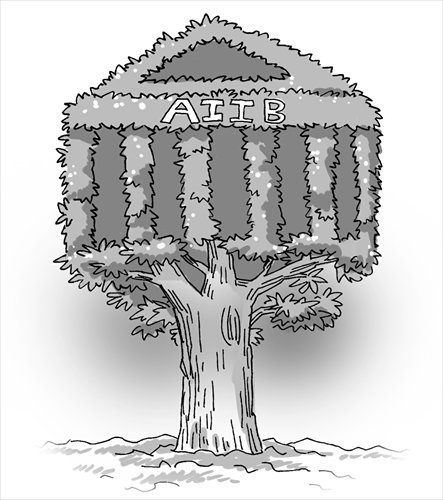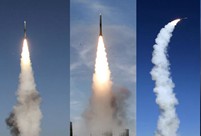

 |
| Illustration: Liu Rui/GT |
The Articles of Agreement of the Asian Infrastructure Investment Bank (AIIB) were signed in Beijing on Monday. They lay the foundation for the opening of the bank by the end of this year. The bank is the world's first multilateral development bank led by a developing country.
The AIIB is the result of Asia's economic development. It was generated by the evolution of a new type of international relations as well as by global multilateral financial cooperation. The basic principle of the AIIB is win-win cooperation, a unique characteristics of current times.
As a development bank, the main goal of the AIIB is to provide impetus for the sustainable development of Asian countries and offer capital assistance for infrastructure projects. The key to the future operation of the AIIB lies in how it will grant loans.
Chinese Finance Minister Lou Jiwei said that the AIIB is a complement, rather than a competitor, to the World Bank and the Asian Development Bank (ADB). It means the AIIB will try to achieve what the other two haven't. It will aim to be more pragmatic and more efficient.
However, this doesn't mean the AIIB can overcome the setbacks the World Bank and the ADB have experienced. The AIIB may not easily solve the problems that the ADB failed to do.
In fact, the AIIB will definitely meet the same problems that the ADB has met before. Some of the problems may relate to the fact that the rules of the ADB cannot adapt to the reality of the country that is in need of loans, but more problems can be attributed to the political system and governance level of the country.
The AIIB needs to consider not only efficiency but also benefits. Both relate to the political situation of the countries in need of loans.
The completion of infrastructure projects is not only determined by funding, but also by the execution and capacity of the governments in charge. This relates to the country's system, governance, productivity level and even its political stability.
Kenneth Rogoff, chief economist of the IMF, once said, what is lacking in many developing countries is not just cash but a capable government.
Greater risks lie in that many developing countries in Asia are going through a period of political transformation. They have limited governance capacity. Growing corruption and unstable politics will lead to unpredictable changes or even failure amid the operation of some projects.
It is not easy to downplay the political elements involved in the conditions of loans. From many projects operated by the ADB and the World Bank, we can see that the politics of the recipient countries should be taken into consideration before loans are granted. Once the loans are granted, the creditors will inevitably be dragged into these countries' politics.
In 2010, a presidential election in Côte d'Ivoire which was intended to unify the long-divided nation plunged the country into further turmoil. The World Bank decided to stop offering loans and urged the country to solve the crisis through peaceful means.
The AIIB is led by China. China once accomplished a number of important projects with the financial support of international development banks. The AIIB can draw on the successful experience of China and promote it to more developing countries in Asia.
It is worth noting that China's experience is related to its political system. The powerful governance capacity and efficiency of pushing forward pilot schemes cannot easily be imitated.
The final and the most important issue is that the projects financed by the AIIB should not only support a country's development, but also enhance that country's ability to sustain its development.
The experience of the World Bank shows that when a project can bring capital and technology to a developing country, its positive impact could be sustainable. If the AIIB is to achieve or even surpass what the World Bank and the ADB have done, it must attach high importance to how to raise the labor level of the debt countries at the every beginning.
 4-year-old cute 'monk' spends summer holiday in temple
4-year-old cute 'monk' spends summer holiday in temple College graduates shining on the red carpet in Nanjing
College graduates shining on the red carpet in Nanjing PLA soldiers launch guided missiles in confrontation exercise
PLA soldiers launch guided missiles in confrontation exercise One woman’s fight against dog eaters
One woman’s fight against dog eaters Beautiful and smart - post-90s college teacher goes viral
Beautiful and smart - post-90s college teacher goes viral Top 10 luxury houses in the world
Top 10 luxury houses in the world  National Geographic: best photos during journey
National Geographic: best photos during journey Couples who engage in meaningful and deep conversations are happier
Couples who engage in meaningful and deep conversations are happier Maldives resort rated best hotel of 2015
Maldives resort rated best hotel of 2015  Europe can reshape Sino-West relationship
Europe can reshape Sino-West relationship  Decades-old meat sold across country
Decades-old meat sold across country Stock market rebounds after policy boost
Stock market rebounds after policy boost  10 cool places to beat China’s summer heat
10 cool places to beat China’s summer heat Day|Week